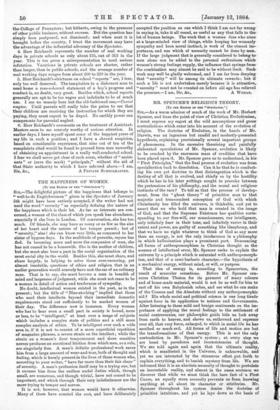THE HAPPINESS OF WOMEN.
170 THE EDITOR OP THE " SPECTATOR.".1 Sra,—The delightful picture of the happiness that belongs to " well-to-do Englishwomen " given in the Spectator of January 5th might have been entirely accepted, if the writer had not used the word " serenity " as especially defining the "nature of the happiness which is their lot. As far as interests are con- cerned, a woman of the class of which you speak has abundance, especially if she lives in London. Of conversation, she has too much. Of friends, she may have as many or as few as the size of her heart and the nature of her temper permit ; but of " serenity," alas ! she can know very little, as compared to her sister of bygone days. In the multitude of pursuits, repose has Red. In becoming more and more the companion of man, she has not ceased to be a housewife. She is the mother of children, but she must also bear a part in the social organisation of the most social city in. the world. Besides this, she must share, and share largely, in helping to solve those ever-recurring, yet almost insoluble, questions of ethics and religion that in an earlier generation would scarcely have met the ear of an ordinary man. That is to say, she must become a man in breadth of mind and largeness of judgment, while she must not cease to be a woman in detail of action and tenderness of sympathy.
No doubt, intellectual women existed in the past, as in the present ; but the title of " Blue-stocking " implied that those who used their intellects beyond their immediate domestic requirements stood out sufficiently to be marked women of their day. The difference now is immense. Every woman who has to bear even a small part in society is bound, more or less, to be "intelligent," at least over a range of subjects which includes a complex state of politics and a still more complex analysis of ethics. To be intelligent over such a wide area is, if it is not to consist of a mere superficial repetition of magazine phrases, a severe strain on the intellect ; while the strain on a woman's finer temperament and there sensitive nerves produces an emotional friction from which men, as a rule,
are singularly free. A man's definite professional work eaves him from a large amount of wear-and-tear, both of thought and feeling, which is keenly present in the lives of those women who, according to your writer, " have far more than their fair share " of serenity. A man's profession itself may be a trying one, but it excuses him from the endless social duties which, though small, are numerous, and though trivial, have not ceased to be important, and which through their very indefiniteness are the more trying to temper and nerves.
It is not, however, that women would have it otherwise. Many of them have counted the cost, and have deliberately accepted the position as one which I think I am not far wrong in saying is, take it all round, as useful as any that falls to the lot of human beings. The work that a woman does who aims at a large-minded view of things, while keeping her womanly sympathy and keen moral instinct, is work of the utmost im- portance, and one which of necessity cannot be done by men.. If the large judgment that is generally considered to belong to- men alone can be added to the personal enthusiasm which women's strong feelings supply, the influence that springs from the combination may almost be said to be without limit. Such work may well be gladly welcomed, and I am far from denying that " serenity " will be among its ultimate rewards ; but if such a life is not undertaken merely because it is attractive,. " serenity " must not be counted on before old age has relieved






































 Previous page
Previous page